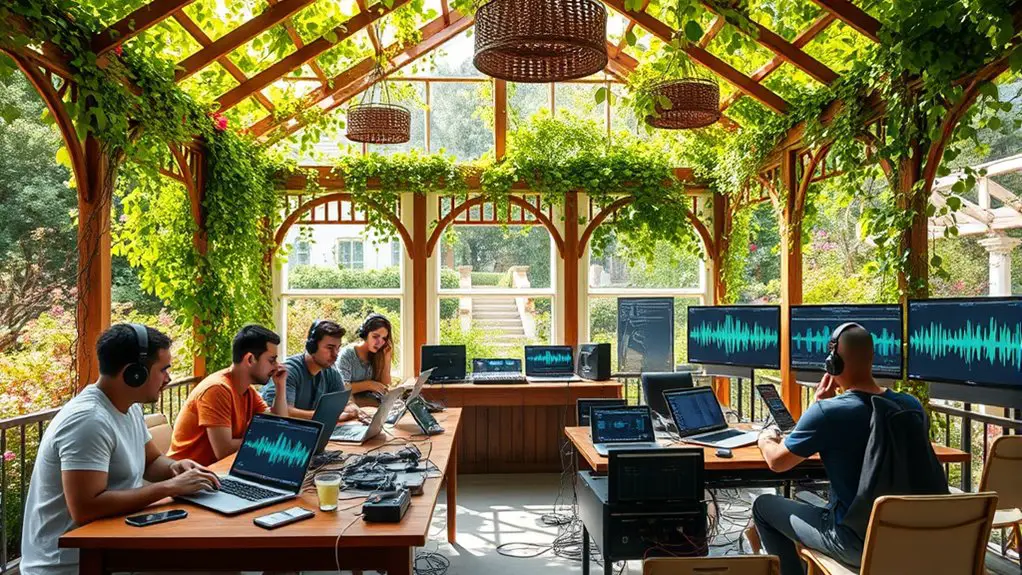Hosting a music production workshop in your gazebo can spark creativity in a cozy environment. Start by choosing the right equipment, like audio interfaces and software tools. Create an inspiring atmosphere with soft lighting and comfortable seating. Plan a balanced agenda with structured learning and hands-on activities. Promote your event through social media and local partnerships, and encourage networking among participants. By following these steps, you can guarantee an engaging and fruitful workshop experience. Learn more about detailed setups and participant activities.
Choosing the Right Equipment for Your Workshop
When you’re planning a music production workshop, selecting the right equipment is essential to guarantee a smooth and productive experience. Start with reliable audio interfaces, as they bridge your instruments and software, ensuring high-quality sound. Look for models that are user-friendly and compatible with your setup—this’ll save you time and hassle. Don’t forget portable microphones; they’re vital for capturing vocals or instruments in any environment. Choose ones that offer versatility and good sound quality, so you can easily record demos. Having these tools at your disposal not only enhances the learning experience but also allows participants to express their creativity freely. By investing in the right gear, you’ll set the stage for an inspiring workshop that encourages artistic exploration.
Designing an Inspiring Atmosphere
Creating an inspiring atmosphere for your music production workshop starts with enhancing the natural ambiance. Consider incorporating elements like soft lighting and plants to foster creativity. Plus, comfortable seating arrangements can make all the difference in keeping participants engaged and relaxed. You might also want to consider adding decorative pillows to enhance comfort and create a cozy environment.
Natural Ambiance Enhancement
How can the right atmosphere elevate your music production experience? By harnessing the power of natural ambiance, you can transform your gazebo into a creative haven. Embrace the natural acoustics around you; the gentle rustling of leaves and birdsong can inspire unique melodies and rhythms. Consider setting up your gear to take advantage of outdoor inspiration, allowing the sounds of nature to blend seamlessly with your music. Use plants and natural elements to enhance the space, creating a serene environment that encourages creativity and collaboration. Soft lighting can also add to the mood, helping your participants feel relaxed and open. When you design an inspiring atmosphere, you’re not just hosting a workshop; you’re inviting freedom and exploration into the music-making process.
Comfortable Seating Arrangements
An inspiring atmosphere goes beyond just natural sounds; it also includes the comfort of your seating arrangements. When hosting a music production workshop, think about various seating styles that cater to different comfort levels. You might want to mix cozy lounge chairs with sturdy stools or even floor cushions for a relaxed vibe. Consider how long participants will be seated—having options allows everyone to find their sweet spot. Make sure to arrange the seating in a way that promotes interaction and creativity. You could even add small tables for notebooks or snacks, enhancing the overall experience. Remember, when attendees feel comfortable, they’re more likely to engage and express their creativity freely, making your workshop a success.
Planning Your Workshop Agenda
While planning your workshop agenda, it’s vital to balance structured learning with creative exploration. Start with some agenda brainstorming to identify key topics, like music theory, software techniques, or sound design. Aim for a mix of presentations and hands-on activities, allowing participants to apply what they learn.
Time management is important, so allocate specific time slots for each section. This keeps the workshop flowing and guarantees everyone gets a chance to engage in their creative projects. Consider leaving some open time for spontaneous collaboration, too. Ultimately, your goal is to create an inspiring environment that encourages freedom of expression while providing valuable insights. With the right agenda, you’ll foster a memorable and productive experience for all attendees.
Promoting Your Event
Once you’ve crafted an engaging workshop agenda, the next step is to get the word out and attract participants. You’ll want to leverage your connections and create buzz. Here are some effective strategies:
- Utilize Social Media: Share exciting updates about your workshop on platforms like Instagram and Facebook. Use eye-catching visuals and engaging stories to draw interest.
- Engage Local Partnerships: Collaborate with local music schools or businesses to tap into their networks for promotion.
- Create an Event Page: Set up a dedicated page for your workshop where people can RSVP and find all necessary details.
- Offer Early Bird Specials: Encourage sign-ups by providing discounts for those who register early.
These tactics will help you reach a broader audience and guarantee a vibrant workshop atmosphere!
Setting Up the Gazebo for Optimal Sound
To achieve the best sound quality during your music production workshop, it’s essential to carefully set up the gazebo. Start by considering the layout; placing your equipment in the center allows for even sound distribution. Next, think about sound reflection. You’ll want to minimize unwanted echoes, so adding acoustic panels can really help. These panels can be positioned strategically around the gazebo to absorb sound waves, creating a more controlled environment. Don’t forget to check the positioning of speakers and microphones to guarantee clarity and balance. Finally, consider using carpets or rugs on the floor to further dampen sound reflection. With these adjustments, you’ll create an inviting space that enhances creativity and collaboration! Additionally, the gazebo provides shade and shelter which can improve the overall comfort for participants during the workshop.
Engaging Participants With Hands-On Activities
With the gazebo set up for ideal sound, you can now focus on making the workshop interactive and enjoyable. Engaging your participants through hands-on activities will keep the energy high and foster creativity. Here are some ideas to contemplate:
Set the stage for creativity by making your workshop hands-on and interactive, ensuring an engaging experience for all participants.
- Interactive Games: Use music trivia or rhythm challenges to spark excitement and competition.
- Group Challenges: Split attendees into teams to create a short song or beat using provided instruments.
- Live Demonstrations: Invite participants to try out music production software, encouraging exploration.
- Feedback Sessions: After activities, gather everyone to share their experiences and insights for collective learning.
These activities not only enhance engagement but also empower participants to release their creative potential in a fun and collaborative atmosphere.
Collaborating on Music Projects
While collaborating on music projects can feel intimidating, it’s one of the most rewarding aspects of the creative process. Embrace the opportunity for creative collaboration; it opens doors to new ideas and fresh perspectives. Start with project brainstorming sessions where everyone can voice their thoughts freely. Encourage participants to share their unique skills—be it songwriting, beat-making, or playing an instrument. This exchange not only enhances the final product but also builds a sense of community. Remember, there are no wrong ideas; every suggestion can spark something amazing. So, set a relaxed atmosphere in your gazebo, where creativity flows naturally, and let the music emerge from the synergy of your combined talents. You’ll be surprised at what you can create together!
Providing Resources and Materials
To make your music production workshop successful, you’ll want to provide participants with the right resources and materials. Start by assembling an essential equipment checklist, so everyone knows what they need to bring or have access to. Additionally, recommending software tools can help guarantee that all attendees are on the same page and ready to create.
Essential Equipment Checklist
When planning a music production workshop, having the right equipment is essential to guarantee a productive and enjoyable experience for all participants. Here’s a checklist to keep your workshop flowing smoothly:
- Audio Interfaces – These are fundamental for connecting instruments and microphones to your computer.
- Musical Instruments – Don’t forget guitars, keyboards, or any other instruments participants might want to use.
- Sound Mixers – A good mixer helps balance audio levels and improve overall sound quality.
- MIDI Controllers – These are critical for creating beats and controlling your recording software.
You might also want to include portable speakers for playback, acoustic panels for sound treatment, and a selection of music samples to inspire creativity. Having these tools at hand will enhance the workshop experience!
Recommended Software Tools
Alongside the right equipment, selecting effective software tools can greatly enhance your music production workshop. You’ll want options that cater to both music editing and sound design, allowing you and your participants to explore creativity freely. Here’s a handy table to help you choose the right software:
| Software | Purpose |
|---|---|
| Ableton Live | Music editing |
| FL Studio | Sound design |
| Logic Pro X | Music editing |
| GarageBand | Beginner-friendly music editing |
| Pro Tools | Professional music editing |
These tools not only simplify the production process but also inspire collaboration and experimentation. By incorporating them, you’ll create an engaging atmosphere where everyone can express their musical ideas!
Encouraging Networking Among Participants
One effective way to enhance the experience of a music production workshop is by fostering networking among participants. Connecting with others can open doors to collaboration and creativity. Here are some practical strategies to encourage networking:
Enhancing a music production workshop experience starts with fostering networking, paving the way for collaboration and creativity.
- Icebreaker Activities: Start with fun icebreakers to help participants relax and get to know each other.
- Group Discussions: Divide participants into small groups for discussions on specific topics or projects.
- Collaborative Projects: Assign mini-projects that require teamwork, allowing participants to share skills and ideas.
- Networking Breaks: Schedule breaks where people can mingle and chat informally, fostering genuine connections.
Following Up After the Workshop
Although the workshop may have ended, the connections and learning shouldn’t stop there. Following up is essential for nurturing those relationships and continuing the creative momentum. Start by collecting feedback; a simple survey can provide valuable insights into what worked well and what could be improved. This not only shows your commitment to growth but also helps tailor future workshops to better meet participants’ needs.
Don’t forget to gather participant testimonials! These can be powerful tools for promoting future events and building your credibility in the music community. Share the testimonials on your website or social media, and encourage participants to stay in touch. By maintaining these connections, you’ll foster a supportive network that thrives on shared creativity and inspiration.
Frequently Asked Questions
What Is the Best Time of Year to Host a Workshop?
Spring’s sunny skies or fall’s festive flair? When deciding the best time, consider weather conditions. Spring offers fresh inspiration, while fall provides cozy vibes. Ultimately, choose what suits your style and audience’s preferences best!
How Many Participants Can Comfortably Fit in a Gazebo Setting?
In a gazebo setting, participant limitations depend on its dimensions. Generally, 8 to 12 participants can fit comfortably, allowing for movement and engagement. Ascertain everyone has space to express their creativity without feeling cramped.
Do I Need Any Permits to Host the Workshop?
Did you know over 50% of local workshops require permits? Before you plunge in, check local regulations and consider workshop insurance to protect yourself and your participants. It’ll keep your creative freedom intact while ensuring safety!
What if It Rains During the Workshop?
If it rains during your workshop, don’t worry! Have a backup plan ready with fun rainy day activities. You can always move indoors or get creative with virtual sessions to keep the energy flowing.
Can I Charge a Fee for Attending the Workshop?
Sure, you can charge a fee for attending the workshop. Consider workshop pricing carefully to reflect attendee benefits. This way, you guarantee participants feel valued and motivated to engage fully in the experience you offer.

